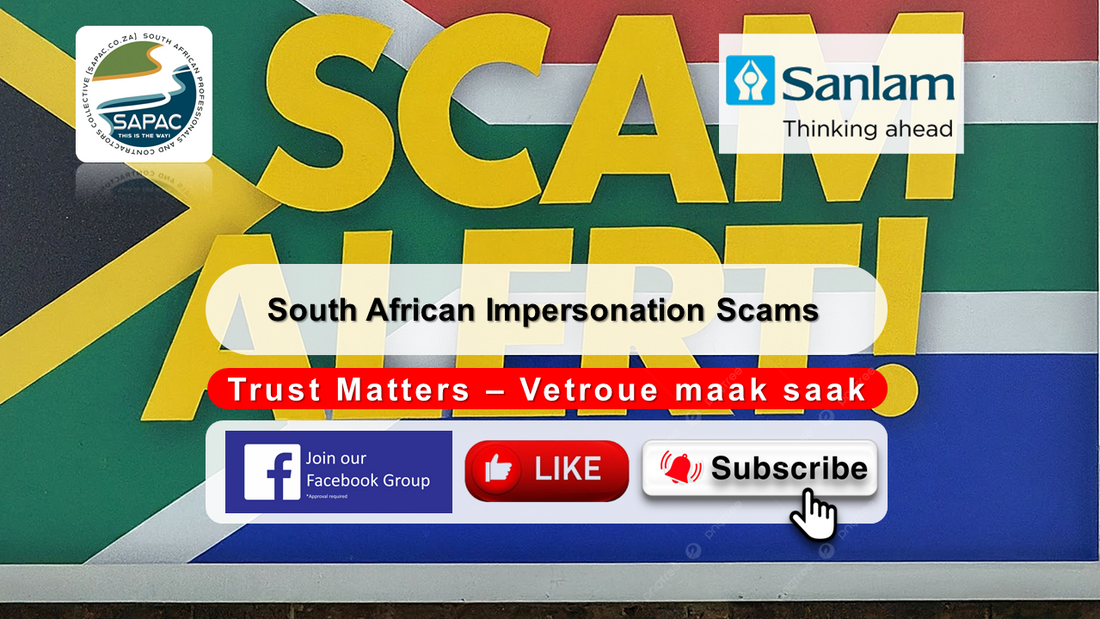
South African Impersonation Scams
SAPAC ReporterShare
South African Impersonation Scams
Prepared by : Independent
Article Classification: Types of Scams
Image courtesy: SAPAC Professionals and Contractors
Get in contact with SAPAC:![]() Besoek | Visit https://sapac.co.za/
Besoek | Visit https://sapac.co.za/
📑 Complete Form: Link (PRESS HERE) FOR SAPAC
[GOEIE INFORMASIE] SLUIT AAN! https://bit.ly/JoinSAPAC
Areas: Southern Africa, Northern Cape, Western Cape, Cape Winelands, Free State, Gauteng, North West Province, Limpopo, Mpumalanga, Natal
South African Impersonation Scams
Scammers impersonate trusted businesses, friends or family, to steal your money or personal information.
Don’t assume a person you are dealing with is who they say they are.
Scammers will trick you into thinking they are from real organizations such as the police, government, banks, associations and well-known businesses. They can even pretend to be your friend or family member.
Scammers use technology to make their call appear to come from a legitimate phone number. Their texts appear in the same conversation thread as genuine messages from an organization.
Warning signs it might be a scam
- You receive a message that asks you to click on a link that takes you to a webpage asking for your username, password, or personal information.
- There is an urgent request for action, and you are asked to provide personal details or money quickly.
- An organization that you think is real, tells you there has been an unauthorized transaction, or asks you to confirm a payment that you didn’t make.
- A business asks you to use a different bank account and bank code from the last payment you made.
- You’re contacted by someone pretending to be from a government department, regulator or law enforcement and they threaten immediate arrest, deportation, or ask you to pay money.
- You’re asked to transfer money to an account to ‘keep it safe’ or for ‘further investigation’.
Steps you can take to protect yourself
Check that a message is real by:
- contacting the person or organization directly using contact details you’ve found yourself on the organizations official website or,
- accessing the organizations' secure, authenticated portal or app (never via a link).
- Immediately cut contact with anyone who tries to threaten or intimidate you.
- Don’t open or download any attachments or apps as these can install malicious software on to your computer or phone.
- Watch out for slight variations in Caller or Sender IDs like dots, special characters, or numbers.
- try to call them on the existing number you have for them
- message them on the new number with a question only they would know the answer to. That way you will know if they are who they say they are.
Think you've been scammed?
1. Act fast to stop any further losses
Contact your bank or card provider immediately to report the scam. Ask them to stop any transactions.
Change passwords on all your devices and online accounts like email, banking, government sites and shopping sites.
2. Report the Scam
Once you have had the opportunity to have secured your details, you should open up a SAPS Case number, you can help us to try and stop the scammers or to warn other by reporting the scam to us. Depending on the nature of the scam site with a case number it can be listed.
3. Get help to recover
With your case number visit your nearest Department of Home Affairs and provide them with the information of your case including your signed affidavit. They should be able to capture the fact that your personal details may have been stolen and may be used for criminal activities. Visit their Website and make an appointment https://www.dha.gov.za/
South Africa Current Time (SAPAC Time) - 24 Hour Format
South African Professionals and Contractors (SAPAC) Time

